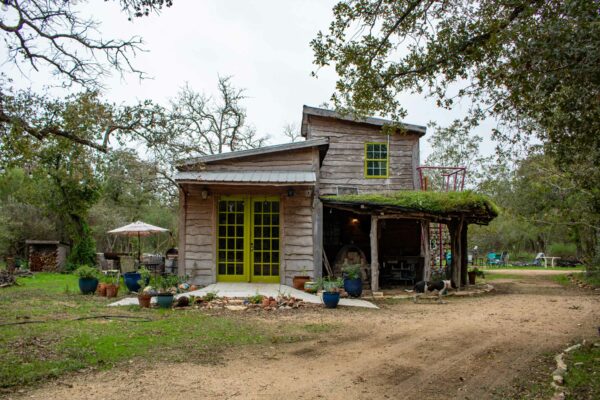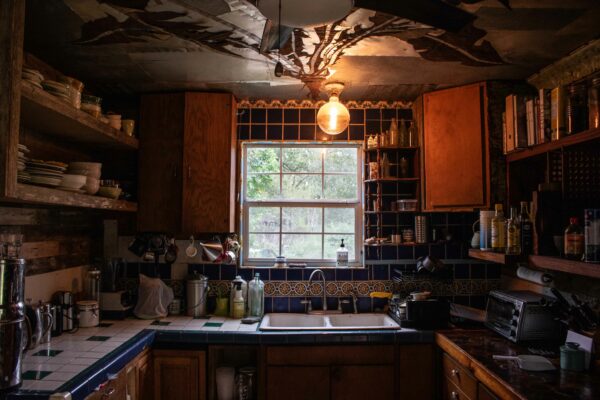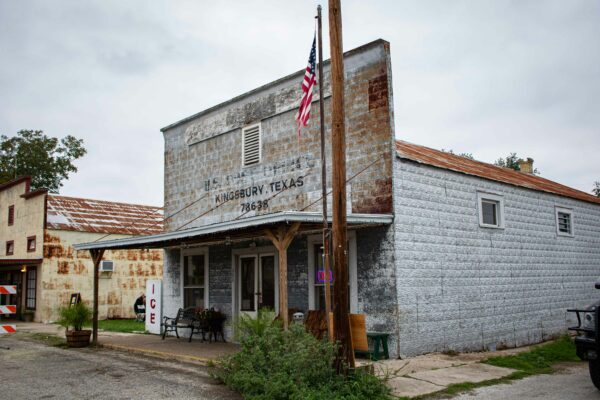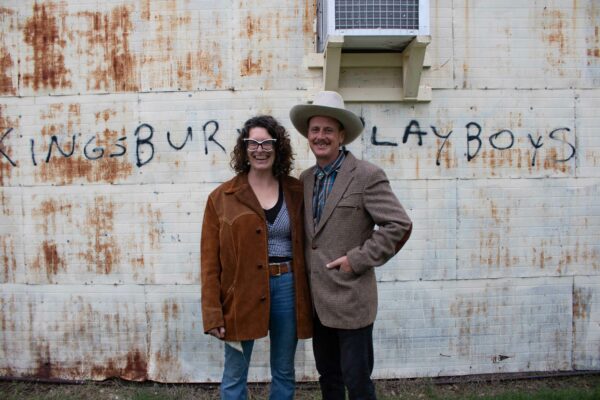It is a rare and bold artist who chooses to live outside of the urban metropolis, who forsakes the mainstream culture of art for a quieter, more pastoral life. Despite spending over twenty years finding success in the New York City art scene, Shane Heinemeier and Allison Ward Heinemeier, founders of the Central Texas nonprofit Habitable Spaces, made exactly such a choice.
“The art industry in the city has become all about money, profit, investing. There’s a lot of dark money involved in the art world, too, and I just got sick of that,” said Allison.
Shane wanted out, too. “I have a love/hate relationship with New York,” he said, lauding its museums, art shows, and food. They both agreed that New York is a great place for making art, because there are collaborators aplenty. But something was missing for them.
“There’s parks in New York,” said Allison, “but parks and nature are two different things. I needed to be in nature.”
Like photographer Sally Mann, who chose to live in rural Virginia, they knew they wanted “a life of simplicity.” One of “pluck, seclusion, and soul-satisfying, ecological, sweat-of-the-brow, we’ll-vote-with-our-lives self-sufficiency.” Their dream included less seclusion than Mann’s, though, and more community. And so in 2011, they moved onto land in Kingsbury, Texas that had belonged to Shane’s family since the 1850s. With a truck full of belongings and a hunter’s tent, they settled. They planned to create an artist’s residency (which began in 2016) in the German-Texas town of 304 people.
Neighbors called them “the tree people.” With the help of other artists and volunteers, Allison and Shane set about building an eco-village and self-sustainable farm. Building the village became their art practice itself, and both a blessing and a curse. They worked with reclaimed wood, metal, and glass. And also with seeds, soil, and animals. Their neighbors suspected a commune.
In some ways, Habitable Spaces is a commune. Anyone who meets Allison and Shane is likely to feel immediately amongst family. After twelve years of building, their village is set up for sharing. They host Full Moon dinners, fall artist’s residencies, and hope to eventually run AirBnbs. Their common house, with its lime green doors, spiral staircase, and ceiling murals, holds a shared kitchen, laundry room, and gathering space. The shower is decorated with a colorful mural around the mirror, making whoever stands in front of it into a work of art. Both the shower and common house are a short walk from a slew of cabins and trailers. There is also the toilet — about which Shane said, “I don’t know why they have to make everything for hippies so difficult.”
“You have to pump it to flush,” clarified Allison. “Like on a ship. Ignore the directions. Follow your instinct.”
47 years before them, the poet Wendell Berry also made a choice to move. He resigned from a teaching position at NYU to return home to rural Kentucky. Like Shane and Allison, he was born of, and ultimately returned to the South. His literary friends worried. “I received letters,” he wrote, “counseling me to remain broad-minded and intellectually aware, admonishing that I should be on the lookout for signs of decay in my work and in my mind.”
On the contrary, Shane and Allison’s city friends supported their move, contributing to Habitable Spaces’ fundraising efforts. But once the two settled in, the divide between rural and urban America became apparent in other ways. “There’s not a lot of money for nonprofits in rural areas, which is something we didn’t realize,” said Allison. “Our compatriots in New York and Austin have so much more funding. It’s been a challenge for us. ”
Wendell Berry, the American writer, might suggest this could be based in bias. “There was the assumption that the life of the metropolis is the experience,” he wrote. “And that the life of the rural towns, the farms, the wilderness places is not only irrelevant to our time, but archaic as well because unknown or unconsidered by the people who really matter — that is, the urban intellectuals.”
Allison and Shane had immediate consideration for both Kingsbury itself and its people. “Both of us were surprised at the depth and amazingness of people here,” Allison said. “There’s so much open-mindedness and acceptance. There are people who may call themselves conservative, but they’re not socially conservative. We never would have met them if we didn’t move here. They hate cities.”
Allison and Shane prioritized getting to know their community. This led Shane to join the Volunteer Fire Department, even serving in 2023 as Assistant Fire Chief. Allison became City Commissioner, joining forces with other neighbors to fully incorporate Kingsbury. Before them, Kingsbury wasn’t officially established as a town and had no local governing body. Now, as an incorporated town, Kingsbury has more autonomy and resources.
Their first year in town, they started an annual Fall Harvest Festival. At the 2023 festival, the sky was gray and the air crisp, but the food was warm. The Volunteer Fire Department sold frito pie, artists sold their work, and beekeepers their honey. Children competed in a hay dive contest, practiced archery, and painted with water balloons. Allison and Shane raised funds for Habitable Spaces via pumpkin quiche, homemade bread with homemade butter, and pulled pork from a pig they raised and slaughtered themselves.
“They’re the real deal,” said a previous Habitable Spaces resident. “Just extremely generous.”
They inspire. Past Habitable Spaces residents have gone on to take similar leaps as Allison and Shane, moving from cities to rural areas or traveling through national parks by trailer. At the most recent Harvest Festival, a woman chatted with Allison about mini jerseys and raw milk. The woman’s passion for organic farming spilled out of her. Days prior, Allison and Shane explained how the government and big farming make it hard and expensive to be a smallholder. The woman could tell she was in kindred company. Allison affirmed, “You’ve come to the right place, because we’re all rebels here.”
With Alison and Shane in town, people in Kingsbury also feel they have someone to open up to about their secret art passions. A former Fire Chief “is a huge classical music fan. He’s also a self-proclaimed conservative redneck,” Allison said.
“With the accent and everything,” Shane chimed in. “When he worked in the oil industry, he got so tired of country music that he started listening to classical music. We’re going to an opera with him.”
Despite the struggles both of being artists and farmers in a country that makes it nearly impossible to be either, Allison and Shane remain steadfastly true to their roles as creatives in the world.
“We need creative people sprinkled all throughout society,” Allison said. “People who think outside the box.”
Rebels. Creators of community, of beauty, and of unconventional ways of being.
Almost finished with their eco-village, Shane and Allison are excited to get back to making different kinds of art.
You can find out more about Habitable Spaces, their residencies, and other programs at their website.






